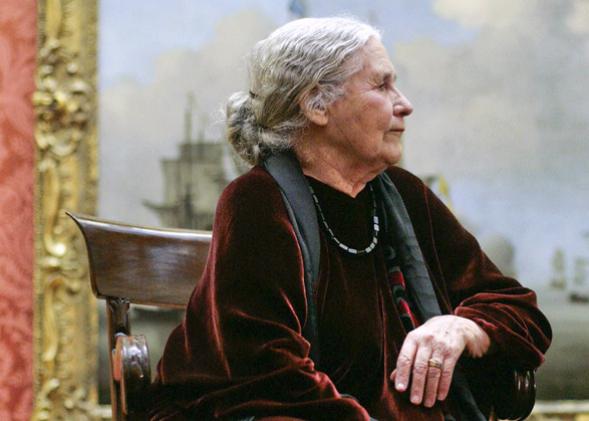Doris Lessing, one of the most celebrated British writers of the last century who wrote The Golden Notebook and The Grass is Singing, died peacefully early Sunday. She was 94. Lessing began her career as an author when a selection of short stories were published in 1948. She would go on to write more than 55 works of fiction, opera, nonfiction, and poetry, and published her final book, Alfred and Emily, in 2008. Born Doris May Tayler in what is now Iran, she moved to Southern Rhodesia (now Zimbabwe) at 5 and stayed there until she was 29.
Lessing became the oldest writer, and only 11th woman, to get the Nobel Literature prize in 2007, when she was 88 years old. “Oh Christ! … I couldn’t care less,” she said when a group of reporters outside her London home informed her she had won the much-coveted prize. “That was typical of the irascible, independent Lessing, who never saved her fire for the page,” notes the Associated Press. At the same time she made it clear there was a part of her that cared: “I’ve won all the prizes in Europe, every bloody one, so I’m delighted to win them all. It’s a royal flush.” Later she said: “I’m 88 years old and they can’t give the Nobel to someone who’s dead, so I think they were probably thinking they’d probably better give it to me now before I’ve popped off,” according to the Guardian.
Until her death, Lessing was best known for The Golden Notebook, which is often referred to as “a feminist bible,” notes the Independent. The book became so famous and was so scrutinized that Lessing later went on to call it her “albatross,” although she did concede the book seemed to have a life of its own. “This book has got a sort of charge to it. It keeps popping up somewhere in some country and I have to say ‘My God, this book has got something. It has got a quality, a vitality,’” she once said, according to the Guardian.
Although many saw her as a feminist icon, Lessing was a frequent critic of modern feminism. In 2001, for example, she told an audience at a book festival that men were the new silent victims because they are “continually demeaned and insulted” by women and can’t say anything, according to the Guardian. “Men seem to be so cowed that they can’t fight back, and it is time they did.” She also said that much of the “great energy” that was sparked by feminism had “been lost in hot air and fine words when we should have been concentrating on changing laws.” She went on to say that even though much had been done to improve women’s lives, “only real equality comes when child care is sorted out and it hasn’t been yet, well not for those who really need it anyway.”
